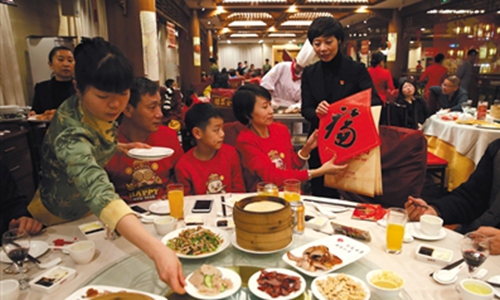HOME >> SOURCE
Spring Festival dinner tables underscore digital advantage
Source:Global Times Published: 2020/1/21 23:06:44

File Photo: Xinhua
From Norwegian salmon, Bostonian lobsters to Chilean cherries, the dinner tables of Chinese people have never been more globalized in the run-up to the Lunar New Year, the most important reunion time for Chinese families.What's behind the most important feast for Chinese points to the key to China's economic appeal - the government's opening-up efforts, growing consumer demand for diversified choices and better quality, and a digital economy that helps accelerate the country's consumption upgrading.
As China is shifting toward a consumption-based economy, its rising household consumption and enhanced opening-up to the outside world indicate the great potential of the Chinese market, which attracts attention from foreign companies and exporters.
According to the National Bureau of Statistics, China's retail sales rose 8 percent year-on-year to some 41.16 trillion yuan ($6 trillion) in 2019, with the contribution of consumption to GDP expansion reaching 57.8 percent and remaining the top growth engine for the economy. Moreover, the country's per capita GDP exceeded the $10,000-mark last year. By any measure, there is still plenty of room for China's consumption to grow.
But most importantly, a large-scale digital market has taken shape in China, offering a significant boost to consumption, which may be the biggest difference between China's consumer market and those in other countries. With the upgrading of internet services, the popularization of e-commerce and the change of consumption habits, China's internet generation of consumers have become accustomed to buying all their daily necessities online. Such efficiency and simplicity have greatly encouraged consumption innovations, providing more and better goods and services options for consumers.
In the process of promoting its consumption upgrading, China's digital economy has not just boosted its foreign trade but also offered a lift to the rural economy. According to information from Tmall, it sold 190 million kilograms of agricultural commodities during a shopping campaign in early January this year, with income for each participating farmer increasing by 1,037 yuan.
With the rise of the digital economy, Chinese farmers are also using the tool to expand marketing channels for their output so as to improve the living standards. That's a big difference between China and India. While rural Chinese are embracing the internet and making use of it, Indians in rural regions are resisting the shifts e-commerce will bring, which somehow explains the great vitality in the Chinese economy.
In short, China's economic prowess lies largely in its digital economy, which sees all parts of society connect with one another to generate continuous momentum for the country to maintain strong growth.
Posted in: GT VOICE